Interview: The Whole Truth Substack
On DOGE, RFK Jr. and the Health Department, Trump's ownership of Truth Social, the Gaetz situation, and what else lies ahead for the incoming administration
Be sure to check out both The Whole Truth Substack and Authentic Intelligence… and subscribe to both!👇
The Department of Government Efficiency (DOGE)
Will:
The incoming Trump administration has stated its intent to significantly reduce bureaucratic headcount and eliminate entire federal agencies. Elon Musk, slated to co-head the DOGE alongside Vivek Ramaswamy, has publicly expressed his goal to reduce the number of federal agencies to fewer than 100, down from the current total of over 400. This is hyperbole, no doubt, but speaks to the intent of DOGE, which was laid out in a recent WSJ op-ed.
While there’s little precedent in modern history for swift and extensive budget overhauls, much less the broad decommissioning of federal agencies, Democrats have shown a propensity to litigate – as opposed to legislate – in challenging Trump’s political ambitions and policy agenda. With Republicans now in control of the Senate and holding a slim majority in the House (and a 6-3 conservative majority in the Supreme Court), how do you anticipate the Trump administration’s plans to decommission federal agencies will be met with legal resistance?
TWT:
So a lot of this is sort of unprecedented—we can give our best guess on what challenges may arise, but we’re also sort of writing the rules book on this in real time.
DOGE appears to be an outside advisory department that will work in conjunction with the Office of Management and Budget (OMB), a White House office that helps the president craft budget proposals to bring to Congress. Anything that goes to the president has to go through OMB first, and anything that comes from the president to other agencies has to go through OMB first. DOGE would be something similar to the OMB and GAO (Government Accountability Office)—helping the President manage federal agencies across the executive branch. It would not be an official cabinet position, which would require the formation of a new government agency and congressional approval.
DOGE’s aspirational budget cuts are intended to come from cutting waste by eliminating pointless jobs, pointless agencies, and otherwise nonsensical spending. Decommissioning efforts have from time to time come through Congress. DOGE, however, is planning to achieve many of its cuts through executive powers and existing legislation.
DOGE, for one thing, plans to cut government jobs unilaterally under a policy called Schedule F, an executive order that Trump signed at the very end of his first term, which never went into effect. It would have reclassified civilian civil servants as at-will employees who serve at the pleasure of the president. We can surely expect the left to characterize this as stripping government employees of their benefits—an odd take, of course, because most US jobs are at-will . . . you can quit or be fired at any time, with or without cause, so long as it was not for a retaliatorily or discriminatory purpose. That way you’re likely to actually show up and do your job at a half-competent level. This might be an opportunity for the Left to claim that the firings are retaliatory or discriminatory, so that could be another source of backlash.
Further, there has already been backlash to the fact that Ramaswamy has said that DOGE intend to cut 75% of the federal government workforce—1.5 million ‘poor’ civil servants would lose their jobs! The obvious response to this is that you are not entitled to your job and continued compensation for that job if the job is unnecessary or if you are just bad at doing it—if its true for you, why should it be any different for our those in government. Yes, it will create temporary hardship. But, of course, it will create long term prosperity. There’s really no basis for litigation here, but we can certainly expect a lot of protests about the “cruel heartless evil republicans” that caused the firings . . .
The greatest pushbacks will be in process to actually ensure Schedule F makes it into effect. When Trump lost the 2020 election, Biden immediately rescinded Schedule F before it ever went into effect . . . and then went one step further. Biden pushed through a regulation which contradicts the mission of Schedule F. This means Trump would have to issue and finalize a new regulation for Schedule F, to override Biden’s. This rule-making process takes months or years.
One work around to this would be if Trump fast-tracked an “interim final rule” (IFR)—a rule that a federal agency issues without going through the rulemaking process (publishing a proposed rule, accepting public comments, etc.). IFRs are effective within 30 days of publication, and all public comments and recommended revisions are requested after publication; then, a “final final” rule will be published, edited to respond to any comments. IFRs are controversial, and typically only occur when agencies have good cause to act swiftly.
Public employee unions could challenge the use of an IFR through a lawsuit, and in doing so will probably seek an injunction—which basically is an order from the court to cease some type of action that could have irreversible consequences until the court can render judgement about whether that action is permissible. If an injunction gets passed, the firings cannot happen until judgment. If the judgment is that the IFR was improper, then Trump would have to go through the typical rule-making process.
So, in short, there are avenues to stall the efforts of DOGE, but we think its unlikely that they will all succeed. Firings are probably not an irreversible consequence likely to warrant injunction, because you can always hire someone back—Especially here, where the roles are getting eliminated rather than getting refilled. However, even if the injunction did go through, it would only be until a Court issued a judgment on whether DOGE had good cause use an ICR over the typical rule-making process. The short answer here is that it’s really, really unlikely that a judge is going to rule against DOGE. In the Little Sisters case, the U.S. Supreme Court strongly implied that IFRs are always valid so long as the agency invites post-promulgation comments and issues an FFR, even if the agency lacked good cause to issue the IFR in the first place. Moreover, even if a Court did rule against the use of IFR somehow …. Trump could just go through the slower, typical rule making process. That’s not the end of the world.
Now, as for full decommissions of federal agencies: DOGE will likely go through Congress to decommission any federal agencies, just as that’s how its historically been done. We can predict the challenges DOGE might face based on historical decommissions. Typically, Congress enacts legislation to discontinue federal agencies, either redistributing or discontinuing the functions of those agencies. In those situations, there were certain common challenges: stakeholders with competing interests and administrative nightmares concerning complex policies aimed at redistribution of functions and resources of an agency during its wind-down.
For one example, we can look at the abolition of the ICC, which originally came about to defend the public from hyper-competitive, monopolistic railroad companies following the boom of railroad transportation in the mid-1800s. The function of the ICC evolved over the next several decades, growing into an entity that more broadly managed the railway industry—with Congress adjusting the ICC role away from protecting the public from monopolistic railroad companies, and more towards managing the competition posed by the trucking industry and the economics of the transportation sector altogether. In the 1970s, Congress and the President, with the support of some stakeholders, found agreement on incremental deregulatory measures that greatly diminished the role and power of the ICC, but it really wasn’t until the early 1990s—when there was bipartisan discontent with the ICC—that the deregulation efforts made some real progress. At that time, ICC abolishment advocates were able to work around the support of the authorizing committee leaders for the ICC by initiating the abolishment process on a bipartisan basis, through the appropriations process. Further, significant cuts to the ICC’s appropriation (and threats of additional cuts to come), along with the Clinton Administration and authorizing committees developing legislation to wind down and abolish the ICC led to the abolishment of many ICC functions and the transfer of the remaining functions to the department of education.
All this to say: decommissioning efforts are messy and slow moving, but they pick up steam with enough popular support from the President, shareholders, and Congress because they rely on passing wind down, functions transfer and abolishment legislation. Under Trump’s second administration, the Republican’s will control both houses of Congress. Assuming everyone falls in line, Trump shouldn’t run into the types of roadblocks that required bipartisan support of Congress for decommissioning the ICC—and even if he did, enough Democrats may be likely to extend a hand across the aisle on this one to save face with their own voters. Democrats have lost the trust of many of the American public—the popular vote in the 2024 election speaks for itself. Even AOC is showing some return to center (by covertly removing her pronouns from an online profile, for example). Democratic Congressmen, by showing a willingness to distance themselves from the corrupt, deep-state “bad” democrats, could align themselves with a “new” democratic party . . . one that can earn popular support again. Further, DOGE can champion Presidential and Congressional efforts (like those taken against the ICC) to massively cut funding for agencies they intend to decommission, and threaten further cuts, in order to force those agencies towards wind-down and abolishment.
As far as litigation goes . . . we think even the democrats will be scratching their heads with this one. Any decommissioning efforts that go through the legislative channels of Congress, and achieve requisite congressional support, should be passed like any other law or regulation. The big judicial checks on acts of congress are really just judicial declarations of their unconstitutionality . . . and there’s no constitutional guarantee for all these federal agencies to exist so its hard to imagine a viable constitutional challenge.
Democrats can always try to slow or stifle the progress by inventing lawsuits that attack Ramaswamy and Musk personally . . . but that’s a whole other issue.
RFK Jr., and the Department of Health and Human Services
Will:
Let’s talk RFK Jr. and the Department of Health and Human Services (HHS). Assuming his appointment is confirmed,1 he’s laid out plans to rejigger the laws surrounding ingredients in many of our processed foods, including banning certain chemicals and additives. Food and agriculture industry groups are well-represented on Capitol Hill from a lobbying standpoint. RFK’s also expressed intentions to disrupt the vaccine approval and recommendation processes at the FDA. Big Pharma’s lobbying presence is also formidable, and the vaccine market size is in the tens of billions (if not hundreds).
What kinds of reforms would you guys like to see achieved by a RFK-led HHS, and what legal challenges might arise in response to these reform efforts?
TWT:
The first issue we need to fix to even get these reforms off the ground, is to prevent the perverse incentive structure produced by our regulatory agencies giving favorable treatment to companies in exchange for lucrative future (post-administration) positions at those companies. For example, a 2016 study found that 15 of the 26 employees who left the FDA later worked for the biopharmaceutical industry. This amounts to legal bribery and essential ‘soft’ corruption. How to stop it? These government agencies currently have safeguards which are supposed to prevent this type of thing, but they’re easy to get around and have proven ineffective. So the first thing to do is for these agencies to re-work their internal conflict of interest rules. Legal scholars have suggested reforming the intra-agency appeals process, as well as forming a new extra-agency body to perform compliance and transparency checks from outside the agencies.
As far as legal challenges, RFK has promised one of his first tasks will be to initiate a RICO (Racketeer Influenced and Corrupt Organizations) action against the major scientific and medical publications and research organizations which, if successful, would require these organizations to reveal the amount of money they receive from pharmaceutical and healthcare companies. So an initial legal challenge will be winning that lawsuit, which will be no easy task given the funds that’ll be available to the defense team.
The most important challenge to overcome, though, will be getting effective legislation through Congress, given that, as you say, there is an extremely robust lobbying presence ready to mobilize in opposition. All agency regulations are based on statutes, passed by Congress, so any new FDA restrictions on additives or improvements to transparency, for example, will require either a reinterpretation of existing legislation or, more likely, new legislation altogether. But overcoming this challenge is definitely possible. MAHA is a very high-profile and popular reform movement—Republican Congressmen won’t want to be seen as the reason it doesn’t come to fruition and have already signaled some support for RFK.2 Secondly, because this is RFK, and because we’re talking about public health reform, it’s not clear that these will be totally partisan votes. If the issue is presented to the public correctly, we might see a couple moderate Democrats getting on board as well.
Trump’s ownership in Truth Social
Will:
Donald Trump holds a 53% ownership stake worth roughly $4 billion in Trump Media DJT 0.00%↑, the parent company of his social media platform, Truth Social. Prior to his first term as president, Trump ceded all operational control of his real estate enterprise while maintaining ownership – I presume he’ll likely do the same vis-à-vis his ownership of Trump Media equity.
However, it’s been reported that Trump Media is in advanced discussions to acquire Bakkt, a cryptocurrency trading platform. Additionally, there are indications that the incoming administration is considering pushing for the establishment of a federal agency dedicated to cryptocurrency oversight.
The intertwining of private business ventures with public regulatory control could raise questions about impartiality and ethical governance. In light of these circumstances, how might the administration be met with legal resistance given these potential conflicts of interest?
TWT:
As far as Presidential Conflicts of interest are concerned, our system largely relies on the President’s good-faith efforts to separate personal interests from the country’s. While Trump’s cabinet members are subject to financial conflict of interest laws, there is no formal legal requirement for the President to divest from his holdings, whether in public or privately traded companies. Historically, Presidents do divest from their holdings if a conflict is highly likely to arise. But this is just a vague norm or convention, and not all Presidents choose the same route—some opting to liquidate their holdings completely, and others to place them into a blind trust (where a trustee makes investment decisions without visibility by the investor).
As far as legal challenges, there is the possibility that Trump could be prosecuted for securities violations (such as insider trading, etc.) if he, say, made decisions with respect to $DJT stock based on non-public information gleaned from his political role. Regarding your question about Bakkt—if Trump cedes operational control, we don’t see any insider trading concerns there, even if during his term Trump oversees the stripping of crypto regulations. Remember, the Supreme Court has ruled that Presidents are immune from prosecution for official acts within their constitutional authority. Oversight of regulatory agencies certainly falls within this box. As far as creating a new agency to oversee crypto specifically, only Congress has the power to create a new federal agency—there shouldn’t be any issues if Trump simply happens to be the incumbent President when the agency is created. In any case, there is no current legal divestiture requirement for the President, and we don’t think we’re likely to see a repeat of the internal DOJ investigation from his first term, nor another impeachment.
The one thing that we may well see, especially if Democrats gain any seats in the mid-terms, is a bill (sponsored solely by Democrats, no doubt) that formally require the President to divest any financial interest posing a potential conflict of interest. This type of bill was introduced by Senator Warren in 2017 but it never got off the ground (and Joe Biden is lucky it didn’t!).
The Matt Gaetz fiasco
Will:
What do you make of the Gaetz situation? There’s a laundry list of theories floating around as to why he resigned and was appointed shortly thereafter, one being that he simply won Trump over during a plane ride and Trump impulsively pulled the trigger on announcing Gaetz’s appointment. Others say it was all a strategic diversion. But the freakin’ guy is now doing Cameo videos for $500 apiece, and it all just seems bizarre. What’s your take?
TWT:
So we are sort of a split house on this one.
Obviously, the timing is suspicious. When congressmen/women are nominated for a cabinet position, they typically do not jump the shark and quit their jobs until the nomination is confirmed—that way they are not out of a job if unconfirmed. Here, Gaetz quit his job immediately after his nomination, without any guarantee that he’d be confirmed. This is made stranger by the fact that, after his nomination, it came to light that a report was about to come out about Gaetz’s past sexual transgressions. This begs the question of whether Gaetz was looking to resign all along, to perhaps avoid the report ever being finalized and published—if he’s out of Congress, it might not be a priority for Congress to investigate him anymore. If that’s the case, though, it makes no sense that he would resign from his position only to catapult to greater national fame in a bid for the more visible and powerful role of AG . . . wouldn’t that make it even more probable that the report against him would be finalized and come to light—only that it would make broader national news when allegations of his deviancy broke? Again, its hard to follow the logic here.
Now, some of us at TWT look at all this and say that there’s no way that Gaetz could not have known that this was all going to come out, and Trump could not have been ignorant to it all—he must’ve done some diligence on Gaetz before announcing the nomination . . . right? If that’s the case, perhaps Trump just wanted to give Gaetz a good excuse to resign from Congress on his own terms, under the guise of nomination, so that Gaetz could then ‘magnanimously’ withdraw from the nomination if/when the allegations broke—rather than have to experience a formal ousting with humiliating Congressional hearings about the allegations against him. Perhaps, as absurd as all this was, the optics of this were better for Gaetz? Further, perhaps Trump thought this could be a win-win for himself too: perhaps he thought that he would score points with liberals that thought of him as a women-hating rapist, if he demonstrated that he would not stand behind and fight for a nominee accused of sexual misconduct . . . or perhaps he thought that, by letting the public have their way on his first AG nomination offer, it would make them less likely to challenge his second AG nomination (who he perhaps wanted this whole time) . . .
The other of us over at TWT doesn’t give Trump quite that much credit. Trump is a lot of things, but conniving, duplicitous, strategic mastermind really is not our impression of him. If that were the case, he’d have had a lot less public gaffes—for one thing, given the public’s overwhelmingly negative view of January 6 and his role in it, he could’ve saved face in his election cycle and garnered more support with voters if he (against belief) admitted that he should have done things differently and signaled accountability for it. But Trump is just not that type of politician—Part of Trump’s charm is that, like him or hate him, he shoots from the hip, is unrehearsed, and does/says what he thinks is right and good even under tremendous popular pressure to do/say the opposite. Given that, and given how absurd this whole story is, it might just be that the simplest answer is the right one: Trump did not know about the report about to break, just hit it off with Gaetz and thought he’d be a good nomination, and went with his gut in nominating him. Then, only when Gaetz immediately resigned and the report came to light, Trump realized that he may have mistepped. In this scenario, it maybe just comes down to Gaetz being a victim of some wishful thinking—perhaps he thought that the report would be damning when it came out, his days in Congress were numbered, and his best chance at keeping a job in politics would be to attempt to swing a nomination and confirmation all before the report came out. Again, super wishful thinking, if that was the case.
In the alternative, Gaetz alone maybe figured he could swing a nomination as an excuse to resign from Congress before the report came out, and then he could withdraw before the report came out—more probable, but still wishful thinking. Anyone associated with Trump, however briefly, is unlikely avoid a ton of negative press coverage as quickly as any dirt can be dug up—the allegations of the report were bound to come out.
The Trump administration: what to expect
Will:
What are you most excited about as it relates to the incoming Trump administration? What are your fears around the administration?
TWT:
‘Drain the Swamp’ is probably #1 on our list. For us, this has two components: (1) Reducing the size and increasing the efficiency of our bloated bureaucracy, and (2) To the extent possible, de-politicizing federal agencies and purging the government of unelected ‘deep-state’ actors. The first component should hopefully be addressed in large part by DOGE. Regarding the second component—the initial battle might be convincing half of the public that any ‘Drain the Swamp’ initiatives are aiming for the de-politicization and cleansing of federal agencies, and refuting the narrative that this is a totalitarian weaponization of those agencies (as it will undoubtedly be framed by certain media sources). From an optics standpoint, the JFK Assassination Records could well be crucial in drumming up public support. If the JFK files reveal American Intelligence was involved or complicit in the assassination, one would have to imagine the American public will begin to clamor for deep-state reform and transparency.
A close second on our list of exciting prospects is RFK’s public health reform. Will the new administration immediately and comprehensively solve the public health crisis? Probably not. But there are threshold changes that will yield immediate dividends. Namely: restoring a purely research-based approach to food and drug regulation, and reducing the cronyism that stems from the intertwinement of private companies and our public health sector. Again, part of the battle will be fighting the narrative that RFK is a crazed anti-vax madman, intent on returning smallpox to the masses. But apart from that, there is every reason to believe that RFK and co. will be able to enact lasting, practical changes to our public health system.
Two main fears come to mind. The first we mentioned briefly already—that the media institution might succeed in painting any overhaul as a crusade for vengeance, rather than a populist reform. While we can’t legislate for the media’s partisanship, public perception will also largely be influenced by the Trump DOJ’s prosecutorial decision-making. It’s important that any investigations are aimed at the ultimate goal of discovering institutionalized corruption and enacting reform—rather than taking revenge on isolated bad actors, just for the sake of it.
Our other concern is that, particularly in the realm of foreign policy, the bar for success might have been set too high. Because of the foreign policy success of his first term, many are expecting Trump to come into office and immediately end the Russia-Ukraine war and the conflict in Gaza. But it may well not be up to him. Post-election, we’ve already seen Biden firing missiles deep into Russian territory—that looked a lot like an attempt at diminishing Russia’s motivation to end the war and weakening Ukraine’s negotiating position. Given the perverse incentive structure created by our Military Industrial Complex, it’s possible that as we speak, forces are conspiring to prolong either or both of these military incursions for as long as possible.
At the time of this writing, the odds of RFK Jr. becoming Trump’s Secretary of HHS are at 63% (per Kalshi).





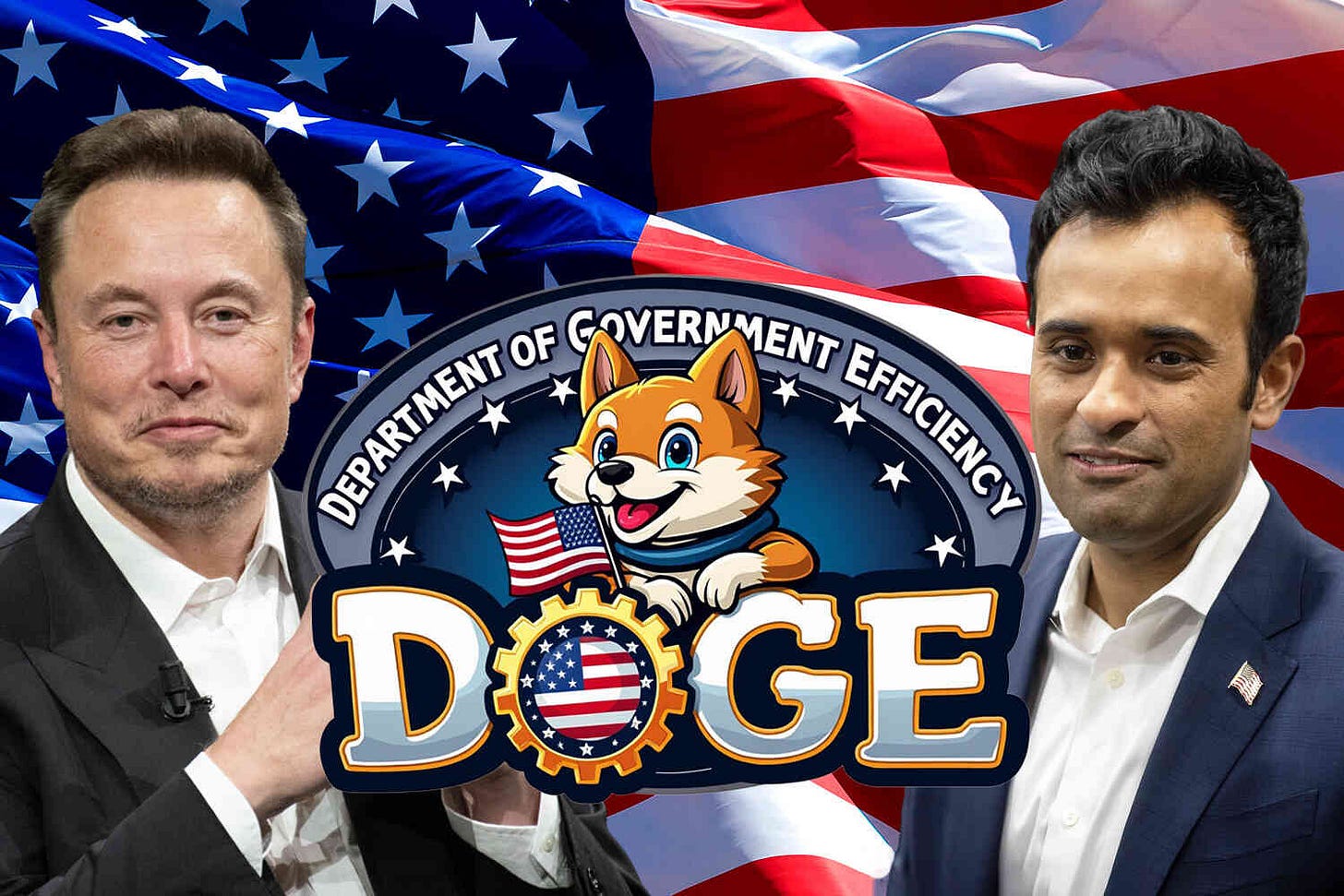
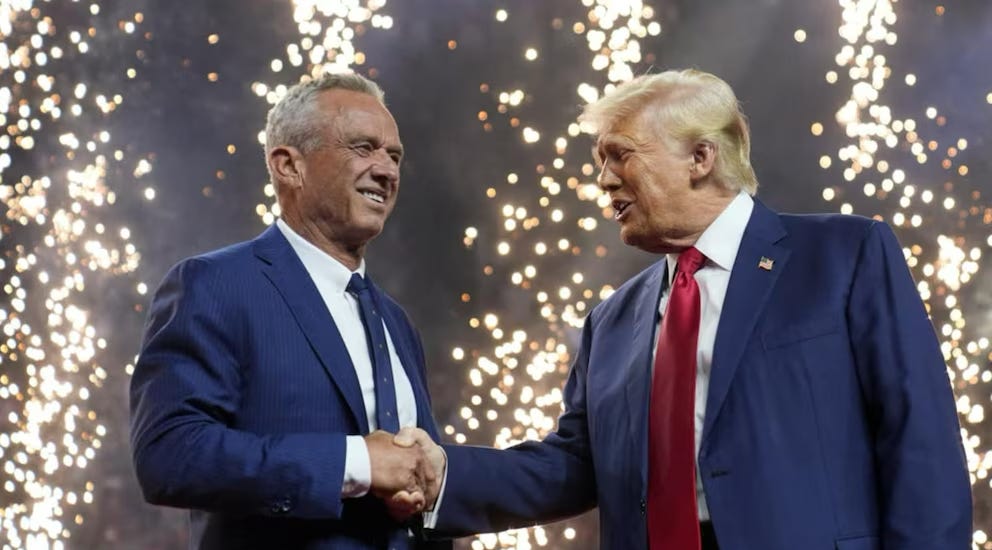
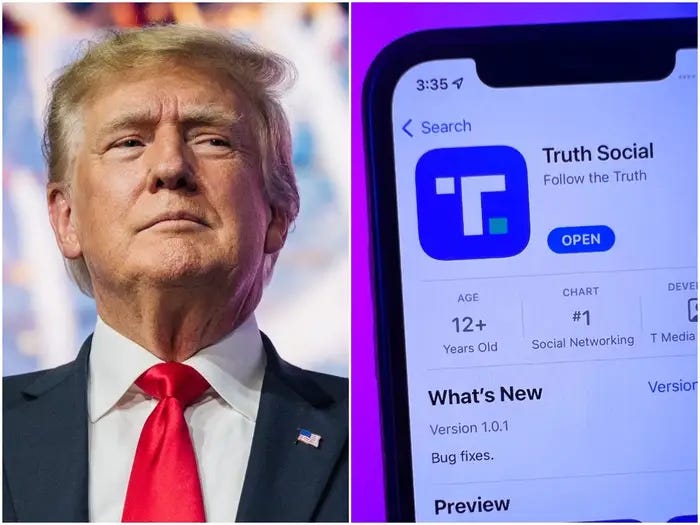
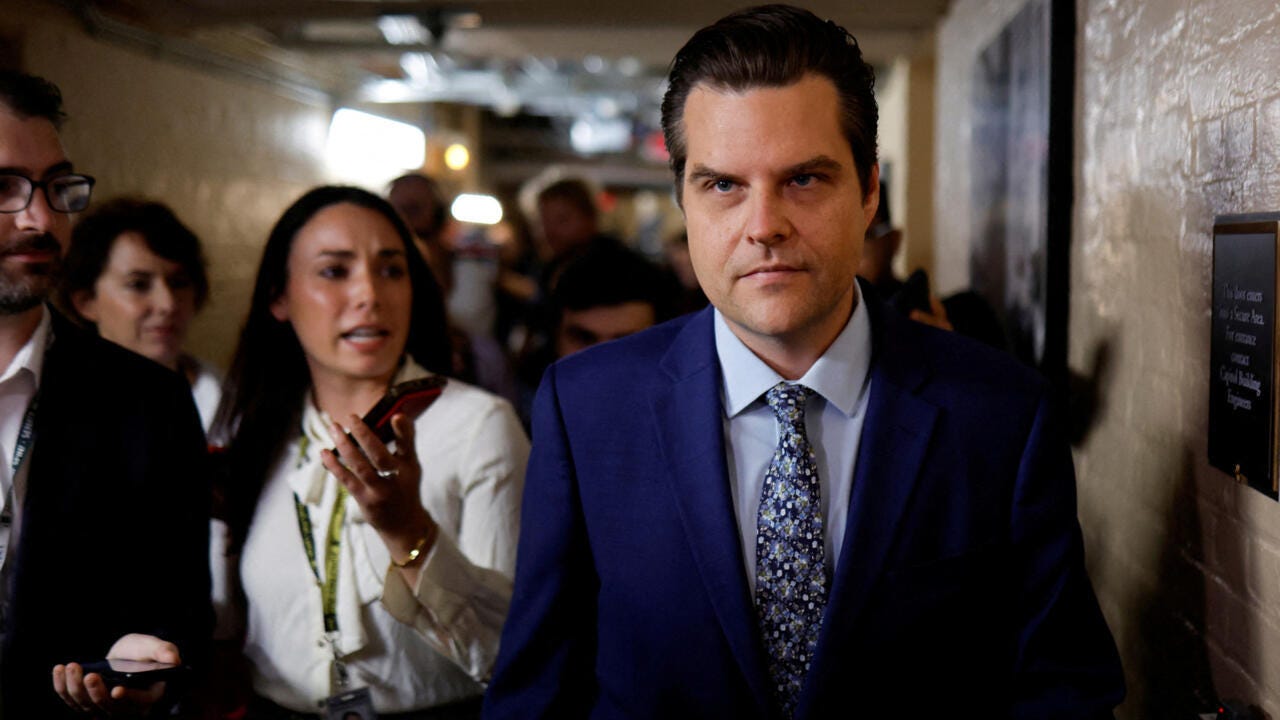
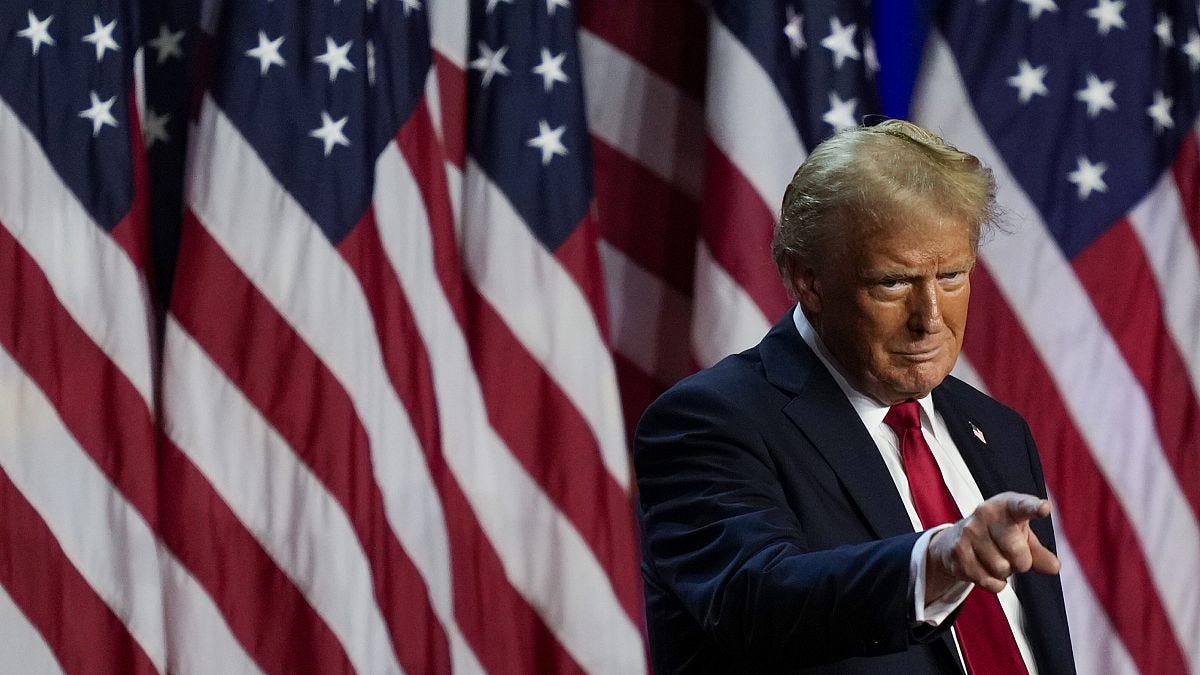

One woud fell better abut this effort if it were aimed at an objective, say getting the same benefits from regulation with less expenditures. Or more benefit from the same or some combination. Starting out with reducing numbers seems quite wrongheaded. I suspect the real benefits of DOGE would come if it could change the basis on which regulatory agencies make decisions toward cost benefit analysis, but this requires detailed work agency by agency and not likely to be accomplished by short-term outside oversight.
Some interesting observations, I'm wondering about the constitutionaliy of some of these agencies. Such as the Department of Education. It's not listed in the Enumerated Powers Act. So eliminating it and similar agencies could be agrued that they were just trying to get the Federal Government back into the Box that is the Constitution. Most of the public will be behind that, the federal employees and some opposing parties will have other arguments.